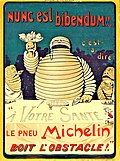Horace

Quintus Horatius Flaccus (December 8, 65 BC - November 27, 8 BC), known to English speakers as Horace, was a famous poet in the Roman Empire.
Life
Horace was born in the small Italian town of Venusia. His father used to be a slave, but was known as a freedman because his master had freed him. They moved to Rome a short time later. Horace's father had a job taking items from the seller to the buyer. He received money from these sales. His father became richer and was able to send Horace to the best schools in Rome. He was also able to send him to Athens (Greece) to study the Greek language and philosophy. Horace's native language was Latin. Horace was incredibly proud of his father, and said he felt no shame in being the son of a freedman.
In his early adult life, Julius Caesar, the Roman dictator, was killed. War was declared against the people who killed him. Horace joined the army. When the war was over, Horace returned to Italy to find that other people were living in his apartment. His father was also gone. Horace became very poor. Eventually, he found a job in the treasury. This involved sorting the country's money.
His friends, Lucius Varius Rufus and Virgil, who were also writers, introduced him to Maecenas. Maecenas was a close friend of Augustus, the emperor of Rome. Horace lived in Tivoli, an area of Rome. When he died, he gave the land he owned to Augustus, to increase the land the state owned. Today, other writers visit the land to remember him.
Quotes
Horace wrote many famous quotes in his poems. These lines are still spoken today, by speakers of every language, in the original Latin.
- Dulce et decorum est pro patria mori - It is sweet and fitting to die for one's country.
- Carpe diem - Pluck the day (Seize the day is the common translation, though it is incorrect in terms of translation and usage).
Poetry
Some of Horace's poems are difficult to translate because of their syntax, grammar and structure, which is sometimes very different to modern languages.
Horace is viewed by many people, including experts, to be one of the best Latin poets.
Horace Media
Horace reads his poems in front of Maecenas, by Fyodor Bronnikov
Horace reciting his verses, by Adalbert von Rössler.
Horace, portrayed by Giacomo Di Chirico
Horace in his Studium: German print of the fifteenth century, summarizing the final ode 4.15 (in praise of Augustus).
Bibendum (the symbol of the Michelin tyre company) takes his name from the opening line of Ode 1.37, Nunc est bibendum.
Odes 1.14 – Wall poem in Leiden
Other websites
| Latin Wikisource has original writing related to this article: |
| English Wikisource has original writing related to this article: |
| Wikimedia Commons has media related to Lua error in Module:Commons_link at line 62: attempt to index field 'wikibase' (a nil value).. |
- Works by Horace at Project Gutenberg
- Espace Horace
- The works of Horace at The Latin Library
- Selected Poems of Horace
- The Perseus Project -- Latin and Greek authors (with English translations), including Horace
- Biography and chronology Archived 2008-12-06 at the Wayback Machine
- Litweb Archived 2006-04-14 at the Wayback Machine
- Horace's works: text, concordances and frequency list







